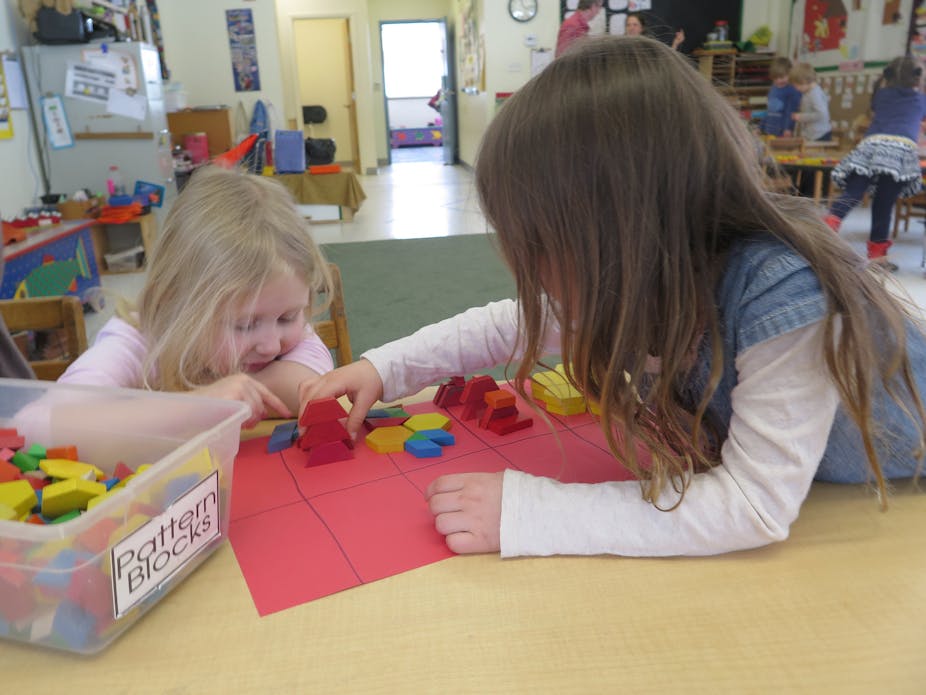
When we look at the overall development of a child, we can divide skills up into a few major categories: Gross Motor, Social-Emotional, Language and so on. The development of foundational skills for learning math can also be divided into categories.
- Number Sense – Understanding Quantity
- Representation – Using Symbols and Words to Represent Numbers
- Shapes and Spatial Relationships (Geometry)
- Measurement – Comparing and Communicating about size
- Patterns – Recognizing and Making Patterns
- Problem Solving
I am writing a series, which will include posts on each of these skills (click on links above to view the individual posts). For each skill area, we’ll look at the developmental stages, and also at how parents or teachers can help children to develop these skills. You may also want to check out my posts on Teaching Math Skills Overview, Financial Literacy, and Science Skills.
Understanding Developmental Stages
In my posts, I will put approximate ages when children tend to acquire these skills in parentheses, but I would encourage you to focus more on the order in which they learn skills rather than thinking of a particular age as a target. If your child is capable of doing something at a younger age than I list, you might be tempted to immediately leap ahead to the next stage. I would encourage you NOT to do that. Let them get REALLY skilled in any one area – keep working on it till it’s completely mastered before you move to the next stage. (It’s like letting them become great at crawling before you push them to walk…) Don’t try to push them faster down the road, push them deeper into a a fuller understanding.
For example, Gwen Dewar on Parenting Science, says
It’s one thing to keep track of three objects, another to understand that the number term “3” refers to all sets of three things. If your child is just starting to learn about numbers, expect slow progress. Research suggests that a 2- or 3-year old kid who has learned the meaning of “1” will take another six months to learn about “2” and three months beyond that to learn about “3.” Altogether, it can take kids about a year to really understand how the counting system works (Wynn 1992). Once your child really “gets” the first four numbers, he will probably find it much easier to tackle higher numbers (Wynn 1992).
If you attempt to push a toddler quickly to count to four, then five, then ten, they may learn to say the words, but if they haven’t really internalized the meaning of 1, 2, and more than 2, they’ll really struggle with interpreting other numerical meanings as they get older. If you let them spend these months really mastering the ideas of 1, 2, and 3 through hands-on experiences with blocks and dolls and counting songs and reading books and so on, then they’ll be better prepared to move on.
My son is in a gifted program at school. They don’t focus on pushing first graders into second and third grade math – getting years ahead of their peers on the basic curriculum wouldn’t gain them much in the long run. Instead, they go deeper and explore things beyond the basic curriculum. For example, where his mainstreamed class is learning basic two dimensional shapes with worksheets, the enrichment class is playing with shapes hands-on, including three dimensional shapes, building them with paper and with building toys like Tangrams, Pattern Blocks, Pentominoes
and Blokus. All this hands-on play will give my son a much deeper and richer understanding
of shapes that will carry through his later education in geometry.
Most Recommended Resources
I looked at many sources when preparing to write this series of posts, these are the ones I think parents and teachers will find most helpful.
- https://childcare.extension.org/young-childrens-developing-math-skills/ Covers developmental milestones, but also links to ideas for teaching activities for each skill
- Learning Pathways in Numeracy has really detailed info on developmental stages of math. https://www.k12.wa.us/sites/default/files/public/wakids/pubdocs/learningpathwaysinnumeracy.pdf
- Becoming a Math Family – https://becomingamathfamily.uchicago.edu/. Includes videos that overview big concepts like “normalize mistakes” and “emphasize effort” plus videos for lots of ideas for hands-on activities.
- Fun activities for teaching math to preschoolers: www.howweelearn.com/preschool-math-activities-curriculum/
- Number and counting songs: www.songsforteaching.com/numberscounting.htm (include not just toddler songs, but songs on counting to 100, equations, beginning fractions….) and https://kcls.org/content-category/counting/
- DREME Family Math: https://familymath.stanford.edu/
- DREME for teacher educators (If you want to dive deep, this is so good!) In depth theory with lots of concrete examples, including videos of kids doing the tasks with descriptions of what’s interesting about the video: http://prek-math-te.stanford.edu/ (You need to set up an account, but it’s free.)
- Links to blogs and videos about “talking to your kids about math”: https://bstockus.wordpress.com/talking-math-with-kids/
- Watch this video: http://www.kenthaines.com/blog/2017/2/2/i-made-a-video-about-talking-math-with-your-kids. His three guidelines are: Use the language of math. Play with your kids and incorporate math into the play. Focus on questions, not answers – get them to think about how you solve a problem.
Other resources used:
- Math Skills and Milestones: http://www.pbs.org/parents/education/math/milestones/
- www.zerotothree.org/resources/299-help-your-child-develop-early-math-skills
- www.naeyc.org/our-work/families/math-talk-infants-and-toddlers
- www.howweelearn.com/preschool-math-activities-curriculum/
- www.naeyc.org/sites/default/files/globally-shared/downloads/PDFs/resources/position-statements/psmath.pdf
Image credit: http://creativeprek.webs.com/mathcenter.htm, marked as free to use.

[…] My other blog, Inventors Of Tomorrow, is about teaching STEM skills to kids. I have more details there. Start with the post on developmental stages of math learning. […]
LikeLike
[…] are several foundational math skills that are core to an understanding of math. One is the idea that a number symbol can be used to […]
LikeLike
Thanks for sharing wonderful information of giving best information. Its more useful and more helpful. Great doing keep sharing.
Videos For Kids – https://www.uspstudios.co
LikeLike
[…] Find info about other math skills and how to teach them: foundational math skills. […]
LikeLike
[…] might also enjoy my posts on Teaching Math Skills, Music and STEM Learning, and Teaching Science Skills. And check out Purdue’s Engineering […]
LikeLike
[…] young children also take a long time to learn foundational concepts. For example, after learning “1” at 2 or 3 years old it can take another six months […]
LikeLike
[…] For more information on milestones go here. […]
LikeLike
You wrote this article very well. Very knowledgeable. Thanks for sharing this article
LikeLike
[…] post on the developmental stages of math learning includes links to LOTS of other great sources of ideas for getting kids engaged with math learning. […]
LikeLike
[…] might also enjoy my posts on Teaching Math Skills, Music and STEM Learning, and Teaching Science Skills. And check out Purdue’s Engineering […]
LikeLike
[…] are six foundation skills for math learning, including […]
LikeLike